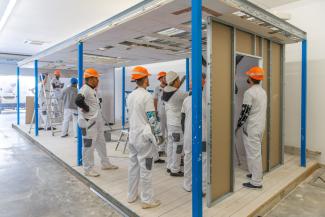DEG
Start-up financing for Africa

This includes, for example, garments factories in Bangladesh (see my contribution in the Tribune section in D+C/E+Z e-Paper 2017/05), a fruit-juice producer in Kenya or a solar park in the Caribbean. The companies financed by DEG must meet certain criteria such as creating new local jobs, complying with labour standards and running environmentally sustainable operations. In 2017, DEG developed an instrument to measure the quality of jobs and the developmental impacts of the companies it finances (see Christiane Rudolph in the Tribune section in D+C/E+Z e-Paper 2017/10).
In 2018, DEG financed private investments in developing countries and emerging economies with the record sum of € 1.9 billion (2017: € 1.6 billion). In 2018, DEG commitments leveraged entrepreneurial investments totaling € 9.8 billion, says Christiane Laibach, chairwoman of the DEG Management Board. She adds: “The development in Africa is particularly pleasing.” In Africa, DEG achieved a new record with equity commitments of € 438 million.
According to Laibach, DEG is striving to promote entrepreneurial initiatives in Africa in order to create prospects for the young, growing population. But, she admits that in many African countries, it is still very difficult to find investment partners. “The market potential is often too small, there is too little purchasing power, the framework conditions for financing and infrastructure are difficult, and there is a shortage of skilled workers,” she sums up.
That is why initiatives by Germany’s Federal Government and in particular the Federal Ministry for Economic Cooperation and Development (BMZ) are very important. They include reform partnerships for more investment in Africa as part of the Marshall Plan with Africa. Laibach cites the example of the German company Knauf International, which has just opened a training centre for young people in Accra, Ghana. It is running hands-on skills courses for architects, civil engineers, construction workers and craftsmen. Knauf is planning further drywall training centres in six African countries.
One focus of DEG’s support is on small and medium-sized enterprises. To this end, DEG further expanded its instrument, the “German Desk – Financial Support and Solutions”. The programme started in 2017, involving local partner banks and Germany’s network of chambers of commerce abroad. The first German Desk was established in Bangladesh in 2018. So far, there are six. The Ghanaian one started working in February 2019. German Desks advise German companies wishing to relocate to the host country as well as their local partners. They even grant small loans.
Another focus is on projects that promote climate and environmental protection. DEG provided a total of € 641 million for this purpose in 2018. One example of this is the financing of the largest solar park in the Caribbean built with German know-how.















